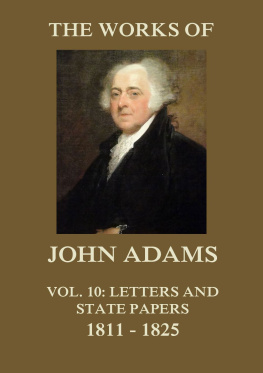HENRY ADAMS
IN THE SECESSION CRISIS
HENRY ADAMS
IN THE SECESSION CRISIS
DISPATCHES TO THE Boston Daily Advertiser,
DECEMBER 1860MARCH 1861
EDITED AND ANNOTATED BY
MARK J. STEGMAIER
Published by Louisiana State University Press
Copyright 2012 by Louisiana State University Press
All rights reserved
Manufactured in the United States of America
First printing
DESIGNER: Michelle A. Neustrom
TYPEFACE: Chaparral Pro
PRINTER: McNaughton & Gunn, Inc.
BINDER: Acme Bookbinding
LIBRARY OF CONGRESS CATALOGING-IN-PUBLICATION DATA
Adams, Henry, 18381918.
Henry Adams in the secession crisis : dispatches to the Boston daily advertiser, December 1860March 1861 / edited and annotated by Mark J. Stegmaier.
p. cm.
Includes bibliographical references and index.
ISBN 978-0-8071-4351-3 (cloth : alk. paper)
ISBN 978-0-8071-4352-0 (pdf) ISBN 978-0-8071-4353-7 (epub) ISBN 978-0-8071-4354-4 (mobi)
1. SecessionUnited StatesHistory. 2. Adams, Henry, 18381918Correspondence. 3. United StatesPolitics and government18571861. 4. United States HistoryCivil War, 18611865Causes. 5. Press and politicsHistory19th century. 6. HistoriansUnited StatesCorrespondence. 7. Boston daily advertiser (Boston, Mass. : 1836) I. Stegmaier, Mark Joseph, 1945 II. Title.
E440.5.A235 2012
973.7'13dc23
2011037856
The paper in this book meets the guidelines for permanence and durability of the Committee on Production Guidelines for Book Longevity of the Council on Library Resources.

for
my grandson, Ryan James Stegmaier
and
my granddaughter, Micaela Grace Stegmaier
ACKNOWLEDGMENTS
In the preparation of this volume, I am indebted to numerous individuals and institutions for assistance. Foremost among these is my wife, Diane, who has been research assistant, travel arranger, manuscript typist, and my most constructive critic. She not only endured the constant revisions which I regularly foisted upon her but also a computerword processorprinter system at home which constantly decided to do things its way rather than hers. Dr. Vivian Thomlinson of Cameron Universitys English Department carefully read through the Advertiser letters and provided insights on their stylistic aspects. Cameron University, through its Academic Research Committee and Katherine D. Lacy Endowed Lectureship, provided generous travel and research grants which made the project doable.
The staffs of the Boston Public Library, Massachusetts Historical Society, and Boston Athenaeum contributed generously of their time and resources. The same friendly service was provided by librarians at the Houghton, Widener, and Lamont libraries at Harvard University. I would also like to thank the library staffs of the New York Public Library, the Free Library of Philadelphia, the Collections Deposit Library of the University of Texas at Austin, the Ohio Historical Society, the Cincinnati Public Library, the Historic New Orleans Collection, the University of Michigan Museum of Art, and the Detroit Institute of Art for their valuable assistance.
The staff of the Library of Congress, particularly those in the Manuscripts Division, deserve thanks for facilitating many hours of valuable research there. As on earlier occasions, William H. Davis of the National Archives searched for and provided copies of pertinent documents.
INTRODUCTION
Henry Brooks Adams, not yet 23 years old and just back from a bit of study and a lot of socializing and travel in Europe, served in Washington as private secretary to his father, Rep. Charles Francis Adams (R-MA), during the Great Secession Winter of 186061 and the second session of the 36th Congress. Henry Adams would write four different accounts of his experiences in those tense and exciting months from December 1860 to March 1861. Historians are familiar with three of the four accounts: the one in his famous autobiographical work The Education of Henry Adams, first published in 1907; his essay The Great Secession Winter of 186061, penned immediately after the event and intended to be a magazine article but not actually published until 1910; and the letters which Henry wrote from Washington to his brother Charles Francis Adams, Jr., in those turbulent days, which were published in the J. C. Levenson et al. six-volume edition of Henry Adamss personal correspondence in the 1980s. But there was a fourth account of the secession crisis written by Henry Adams, lengthier and including more information and commentary than the other three, with which modern historians have no familiarity and which few probably even know that Adams wrote. This account, presented in this volume for the first time since its original publication, consists of the twenty-one unsigned letters which Adams wrote from Washington as a correspondent for the Boston Daily Advertiser.
J. C. Levenson and the other editors of the Adams correspondence chose not to include Adamss letters to the Advertiser in their six-volume edition (or in two supplemental volumes of additional correspondence). In his introduction to the Letters, Professor Levenson wrote that the editors decided to exclude the Advertiser correspondence because it was straightforward political journalism
This judgment, I believe, represents a considerable undervaluation of the importance of Adamss Advertiser letters as an account of that momentous Winter session in Washington. I think it is a mistake to dismiss this longest of Adamss four written records of the secession crisis as if it contained a merely colorless record of events written without style or emotion or opinion. Indeed, the Advertiser letters depicted events and participants in the crisis with spirit, insight, humor, and, sometimes, strong bias. Overall, Adamss newspaper correspondence is as valuable a tool for the modern researcher studying the Secession Winter as almost any other contemporary source, especially for the study of that group of Republicans who, while wishing to remain steadfastly loyal to the partys platform and doctrines, also sought to find compromise solutions to issues if they possibly could. Adams was a good writer, even at that early stage of his career, and his Advertiser letters were both readable and informative. And, unlike many of his fellow Washington correspondents, Adams concentrated his analysis and description entirely on the main eventsthe fate of the Union and what the Washington politicians and the southern states would do in the wake of Abraham Lincolns election as president of the United States. Many Washington correspondents attempted to recount everything that went on in Washington, from the significant to the trivial. Adams ignored the trivial, everyday, merely local news; he realized that he was living through and writing about an extraordinary epoch in U.S. history, and he concentrated his correspondence to the Advertiser on aspects of the crisis which developed into the Civil War a few months later. His capacity as secretary to an important member of the House provided young Adams with a special vantage point among Washington letter-writers, but it was a privileged position which Adams could not openly acknowledge in his letters nor even allude to in very much detail, for fear of compromising the anonymity he jealously guarded and the important work in which his father was engaged. Henry Adams was not one of the correspondents accredited to sit in the reporters gallery of either the Senate or the House; he did report on speeches in both chambers, but did so as an observer in the public galleries.







